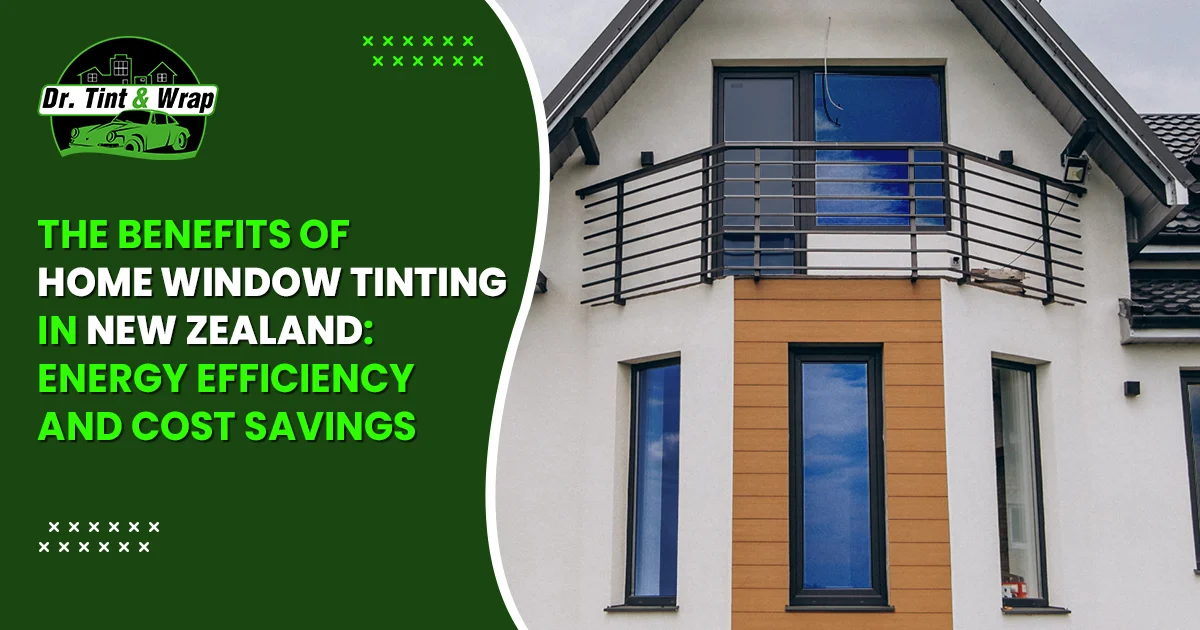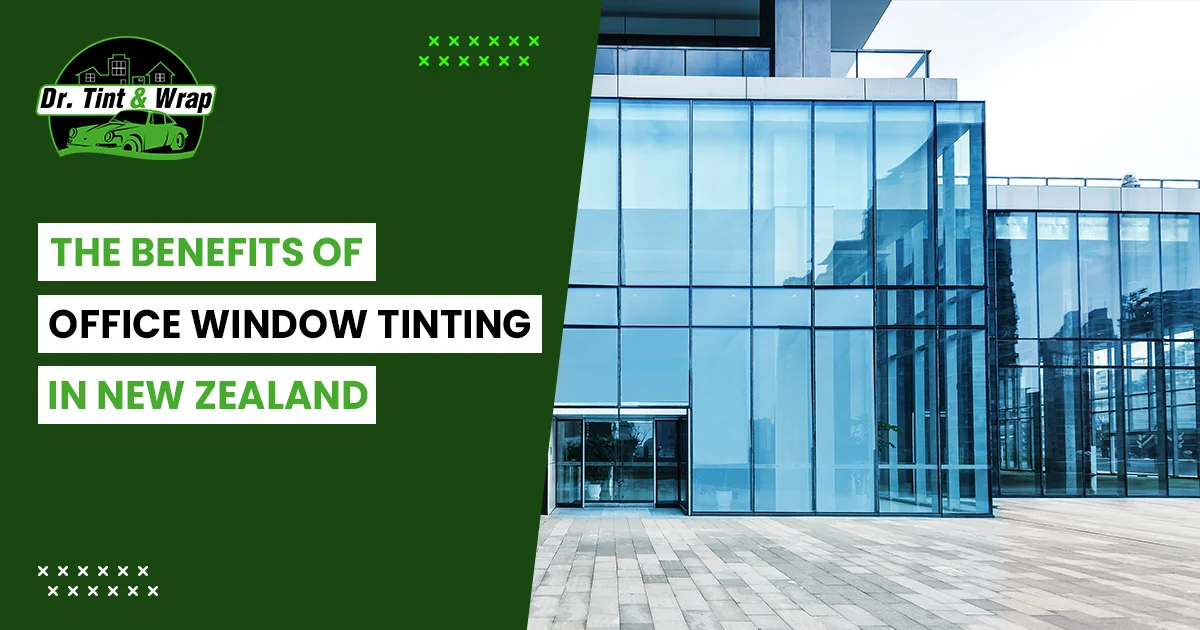
The Benefits of Home Window Tinting in New Zealand: Energy Efficiency and Cost Savings
13 Sep 2023, By AdminWhen it comes to enhancing the comfort and functionality of your home, window tinting is a solution that often goes unnoticed. In New Zealand, where climate variations are common, the benefits of home window tinting extend far beyond aesthetic appeal. In this article, we'll explore how home window tinting can significantly reduce your energy bills and lead to long-term cost savings, making it a smart investment for homeowners across the country.
Understanding the Energy Efficiency of Window Tinting
New Zealand experiences a range of weather conditions throughout the year, from scorching summers to chilly winters. During these extremes, the energy used to regulate indoor temperatures can skyrocket. This is where window tinting comes into play.
1. Heat Reduction: One of the primary benefits of window tinting is its ability to reduce heat gain. Tinted windows block a significant portion of the sun's heat and harmful UV rays from entering your home. As a result, your indoor spaces remain cooler during hot summer months, reducing the need for air conditioning.
2. Insulation: Window tinting also provides insulation benefits, helping to maintain a consistent indoor temperature. In winter, it helps to keep warmth inside, reducing the need for excessive heating.
Cost Savings Through Window Tinting
Now, let's delve into how these energy-efficient qualities translate into tangible cost savings for homeowners in New Zealand.
1. Lower Energy Bills: By reducing heat gain during the summer and heat loss during the winter, window tinting significantly reduces your reliance on heating and cooling systems. As a result, you'll see a noticeable drop in your energy bills year-round.
2. Extended Appliance Lifespan: Reduced reliance on air conditioners and heaters not only saves you money on electricity but also extends the lifespan of these appliances. They don't have to work as hard, which means fewer repairs and replacements.
3. Furniture and Flooring Preservation: Window tinting also blocks harmful UV rays that can cause fading and damage to your furniture, flooring, and décor. This means you won't have to spend as much on replacing or refurbishing these items.
4. Enhanced Home Value: A home with energy-efficient features like window tinting can command a higher resale value in the New Zealand real estate market. Potential buyers are often willing to pay more for a home with reduced energy costs.
In New Zealand, where energy efficiency and sustainability are becoming increasingly important, home window tinting stands out as a practical investment for homeowners. By reducing energy bills, extending the lifespan of appliances, preserving your interior, and enhancing your home's value, window tinting offers numerous long-term cost-saving benefits.
So, if you're looking to make your New Zealand home more energy-efficient and cost-effective, consider investing in professional window tinting services. Not only will you enjoy a more comfortable living space, but you'll also contribute to a greener and more sustainable future while saving money in the process.

The Benefits of Office Window Tinting in New Zealand
13 Sep 2023, By AdminWhen it comes to enhancing the comfort and functionality of your home, window tinting is a solution that often goes unnoticed. In New Zealand, where climate variations are common, the benefits of home window tinting extend far beyond aesthetic appeal. In this article, we'll explore how home window tinting can significantly reduce your energy bills and lead to long-term cost savings, making it a smart investment for homeowners across the country.
Understanding the Energy Efficiency of Window Tinting
New Zealand experiences a range of weather conditions throughout the year, from scorching summers to chilly winters. During these extremes, the energy used to regulate indoor temperatures can skyrocket. This is where window tinting comes into play.
1. Heat Reduction: One of the primary benefits of window tinting is its ability to reduce heat gain. Tinted windows block a significant portion of the sun's heat and harmful UV rays from entering your home. As a result, your indoor spaces remain cooler during hot summer months, reducing the need for air conditioning.
2. Insulation: Window tinting also provides insulation benefits, helping to maintain a consistent indoor temperature. In winter, it helps to keep warmth inside, reducing the need for excessive heating.
Cost Savings Through Window Tinting
Now, let's delve into how these energy-efficient qualities translate into tangible cost savings for homeowners in New Zealand.
1. Lower Energy Bills: By reducing heat gain during the summer and heat loss during the winter, window tinting significantly reduces your reliance on heating and cooling systems. As a result, you'll see a noticeable drop in your energy bills year-round.
2. Extended Appliance Lifespan: Reduced reliance on air conditioners and heaters not only saves you money on electricity but also extends the lifespan of these appliances. They don't have to work as hard, which means fewer repairs and replacements.
3. Furniture and Flooring Preservation: Window tinting also blocks harmful UV rays that can cause fading and damage to your furniture, flooring, and décor. This means you won't have to spend as much on replacing or refurbishing these items.
4. Enhanced Home Value: A home with energy-efficient features like window tinting can command a higher resale value in the New
Zealand real estate market. Potential buyers are often willing to pay more for a home with reduced energy costs.
In New Zealand, where energy efficiency and sustainability are becoming increasingly important, home window tinting stands out as a practical investment for homeowners. By reducing energy bills, extending the lifespan of appliances, preserving your interior, and enhancing your home's value, window tinting offers numerous long-term cost-saving benefits.
So, if you're looking to make your New Zealand home more energy-efficient and cost-effective, consider investing in professional window tinting services. Not only will you enjoy a more comfortable living space, but you'll also contribute to a greener and more sustainable future while saving money in the process.

The Benefits of Car Window Tinting in Rotorua: A Comprehensive Guide
13 Sep 2023, By AdminCar owners in Rotorua have long been seeking ways to enhance their driving experience, not only for aesthetics but also for practicality. One of the most effective and popular methods to achieve this is through car window tinting. Whether you are a seasoned driver or a new car owner, understanding the advantages of car window tinting in Rotorua will undoubtedly influence your decision to invest in this beneficial modification. In this comprehensive guide, we will explore the various benefits of car window tinting, with a particular focus on the keyword "car window tinting Rotorua."
1. Improved Driving Comfort
Rotorua's climate can be intense, with harsh sunlight and rising temperatures during summer months. Car window tinting can significantly improve your driving comfort by reducing the amount of heat entering your vehicle. The tinting film acts as a barrier, blocking a significant portion of harmful UV rays, which not only provides a cooler interior but also protects your skin from potential damage caused by prolonged exposure to the sun.
2. Enhanced Privacy and Security
Privacy is a crucial aspect of driving, especially when you have valuable items in your car. Window tinting offers an added layer of privacy by making it more challenging for prying eyes to see inside your vehicle. This can deter potential thieves and safeguard your belongings. Moreover, window tinting strengthens your car windows, making them more resistant to shattering in case of accidents or attempted break-ins, thereby enhancing your overall security.
3. Glare Reduction for Safer Driving
Glare from the sun and headlights of other vehicles can be a major safety hazard while driving in Rotorua, particularly during sunrise and sunset. Car window tinting significantly reduces glare, improving visibility and reducing eye strain. This allows you to concentrate on the road better and enhances the overall safety of your driving experience.
4. Preservation of Upholstery and Interior
Prolonged exposure to sunlight can cause fading, cracking, and deterioration of your car's interior materials. Window tinting acts as a barrier against harmful UV rays, preventing interior damage and helping your car's upholstery maintain its appearance and value for a more extended period.
5. Energy Efficiency and Fuel Savings
As car window tinting effectively reduces the interior temperature, it reduces the need for air conditioning, especially during hot days in Rotorua. This, in turn, leads to improved fuel efficiency, helping you save money on gas while also reducing your carbon footprint.
6. Aesthetic Appeal and Vehicle Value
Car window tinting not only enhances your car's appearance but can also add value to your vehicle. The sleek and sophisticated look achieved through window tinting can make your car stand out and attract potential buyers if you decide to sell it in the future.
7. Health Benefits
UV rays can have harmful effects on your health, increasing the risk of skin cancer and other skin-related issues. Car window tinting with UV-blocking properties offers an extra layer of protection against these harmful rays, benefiting both the driver and passengers alike. Dr. Tint & Wap Rotorua is more than just a cosmetic modification. We offer numerous practical advantages that enhance your driving experience, protect your health, and preserve your vehicle's value. From increased driving comfort to improved privacy and security, and from glare reduction to energy efficiency, the benefits of window tinting are undeniable. So, if you're a car owner in Rotorua looking to elevate your driving experience, consider Dr. Tint & Wrap for professional car window tinting to enjoy all the incredible advantages and better driving experience.

Dr. Tint & Wrap: Elevating Your Driving Experience with Professional Car Audio Fitting Services
13 Sep 2023, By AdminIn the ever-evolving world of automobile technology, one aspect remains timeless and treasured: the joy of music on the road. Whether you're cruising down the highway or stuck in traffic, the right car audio system can transform your drive into an unforgettable experience. Dr. Tint & Wrap, a renowned name in automotive customization, has taken the wheel by offering professional car audio fitting services that are second to none. In this blog, we'll delve into the importance of car audio fitting services and explore the numerous benefits of choosing Dr. Tint & Wrap for your audio upgrade needs.
The Importance of Car Audio Fitting Services
A car audio system is more than just a collection of speakers and wires; it's a harmonious blend of engineering and artistry. Properly installing and tuning these systems is crucial for unlocking their full potential. Here's why car audio fitting services are essential:
1. Sound Quality: Achieving optimal sound quality requires precise placement of speakers, subwoofers, and amplifiers. Professional installation ensures that your audio system delivers clear, balanced, and immersive sound.
2. Safety: DIY installations can lead to electrical issues, safety hazards, and voided warranties. Car audio fitting services by experts like Dr. Tint & Wrap guarantee a safe and reliable setup.
3. Aesthetics: Professional installers consider both functionality and aesthetics, seamlessly integrating components into your vehicle's interior for a polished and clean look.
4. Customization: Every car and owner is unique. Professional fitting services allow for customization, ensuring your audio system suits your preferences and style.
Benefits of Choosing Dr. Tint & Wrap
Dr. Tint & Wrap isn't just any car audio fitting service; they're a trusted name in the automotive customization industry. Here are some compelling reasons why you should consider them for your car audio upgrade:
1. Expertise: With years of experience, Dr. Tint & Wrap's technicians are skilled in the art of car audio installation. They understand the intricacies of different vehicle makes and models, ensuring a tailored solution for each client.
2. Premium Products: Dr. Tint & Wrap sources only the finest car audio components from top brands, guaranteeing high-quality sound and long-lasting performance.
3. Customization: Whether you're a bass enthusiast, an audiophile, or simply seeking improved sound clarity, Dr. Tint & Wrap can design and install a system that aligns with your unique preferences.
4. Cutting-Edge Technology: Staying up-to-date with the latest advancements, Dr. Tint & Wrap offers state-of-the-art audio systems with features like smartphone integration, touchscreens, and voice controls.
5. Attention to Detail: Beyond exceptional sound quality, Dr. Tint & Wrap pays meticulous attention to every detail, ensuring a seamless and aesthetically pleasing installation that complements your vehicle's interior.
6. Customer Satisfaction: Their commitment to customer satisfaction is unparalleled. Dr. Tint & Wrap takes the time to understand your requirements, making sure you leave their shop with a smile on your face.
When it comes to car audio fitting services, Dr. Tint & Wrap is the name you can trust. Elevate your driving experience with a professionally installed audio system that brings your favorite tunes to life. Say goodbye to subpar sound quality and hello to the symphony of music on the road. Contact Dr. Tint & Wrap today and embark on a journey of sonic excellence that will make every drive a memorable one. Your ears—and your passengers—will thank you.
